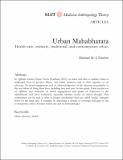Urban Mahabharata: Health care, ordinary, traditional, and contemporary ethics
Author(s)
Fischer, Michael M. J.
Downloadart-fischer-mat-v4_3.pdf (394.9Kb)
PUBLISHER_CC
Publisher with Creative Commons License
Creative Commons Attribution
Terms of use
Metadata
Show full item recordAbstract
In Affliction: Health, Disease, Poverty (Fordham, 2015), we listen with Das to ordinary ethics in challenged lives of poverty, illness, and family relations; and in three registers of (a) advocacy, (b) moral engagement, and (c) acknowledgement of the inherent uncertainties in the very fabric of living these lives, including hers and ours. In this article, I take up the text of Affliction, and comment on moral engagements and sparks of references to the Mahabharata and other traditional, especially Muslim, modes of ethical thought. This commentary can be read as what in Islamic scholarship often are called ‘hashiye’, marginal notes on the main text. I conclude by discussing a mosaic of coverage and gaps in the contemporary ethics of Indian health care and its anthropologies.
Date issued
2017-09Department
Massachusetts Institute of Technology. Anthropology Program; Massachusetts Institute of Technology. Department of HumanitiesJournal
Medicine Anthropology Theory | An open-access journal in the anthropology of health, illness, and medicine
Publisher
Medicine Anthropology Theory
Citation
Fischer, Michael. “Urban Mahabharata: Health Care, Ordinary, Traditional, and Contemporary Ethics.” Medicine Anthropology Theory | An Open-Access Journal in the Anthropology of Health, Illness, and Medicine 4, 3 (September 28, 2017): 98 -129 © 2017 Fischer
Version: Final published version
ISSN
2405-691X